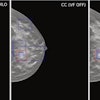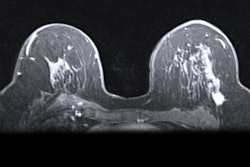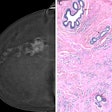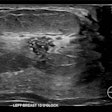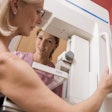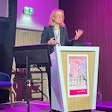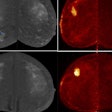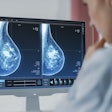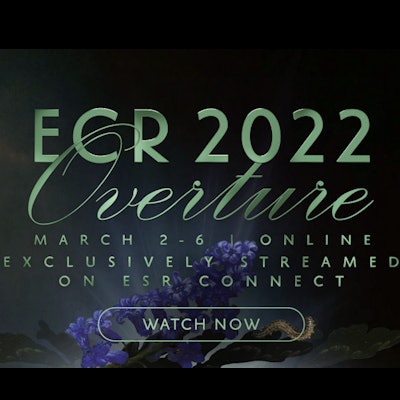
Although advocates of contrast mammography won some converts, breast MRI was still preferred as the main breast cancer screening option for intermediate-risk women in a debate on 2 March between advocates of the two technologies at the ECR Overture.
Breast MRI and contrast-enhanced mammography have been explored in recent years to detect and diagnose breast cancer as an alternative to conventional mammography for intermediate-risk women. However, there is no consensus among researchers as to which technique is superior. This ongoing debate netted a 2022 EuroMinnie award for being the most significant news event in European radiology.
For ECR Overture, researchers took several minutes to state their cases. Dr. Ritse Mann, PhD, from Radboud University Medical Center in the Netherlands, spoke in support of breast MRI. On the other side, Dr. Marc Lobbes, PhD, from Zuyderland Medical Center in the Netherlands, spoke in support of contrast-enhanced mammography.
For his points, Mann focused on MRI's high sensitivity and promising advancements in specificity, which has long been a shortfall of the technique in clinical use. Large studies that Mann cited and took place between 2010 and 2020 saw specificities ranging from 83% to 98.4%.
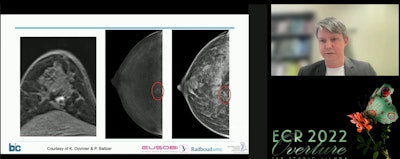 Dr. Ritse Mann, PhD, threw his support behind breast MRI in a special "pros and cons" debate session at the ECR Overture on 2 March. Citing previous research, Mann pointed to MRI's high sensitivity and cost-effectiveness, as well as contrast-enhanced mammography's inherent risks for patients.
Dr. Ritse Mann, PhD, threw his support behind breast MRI in a special "pros and cons" debate session at the ECR Overture on 2 March. Citing previous research, Mann pointed to MRI's high sensitivity and cost-effectiveness, as well as contrast-enhanced mammography's inherent risks for patients.Mann also used comparative studies that support MRI's use over contrast-enhanced mammography. The studies, which took place between 2017 and 2020, showed that MRI had higher sensitivity. Patient populations ranged from 45 to 318.
"You find more cancers, but more importantly, they're smaller, lower-stage, and node-negative," Mann said of breast MRI.
Mann also pointed to mammography's risks, including radiation exposure and the discomfort patients face with breast compression. In a 2021 Plus Magazine article Mann cited, 90% of surveyed women indicated their dissatisfaction with conventional mammography for breast screening.
"The clear message there is to get rid of the painful mammogram. Now, why on Earth would we go back to contrast-enhanced mammography screening for this population?" said Mann, who is also an executive board member of the European Society of Breast Imaging. "Basically, it moves us back into the stone age."
The pros of contrast mammography
For his part of the debate, Lobbes talked about contrast-enhanced mammography having superior specificity. A meta-analysis from 2020 that he cited showed that while both methods had a pooled sensitivity of 97%, mammography's specificity was 66% compared with 52% for MRI.
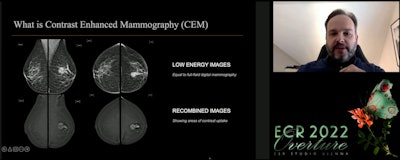 Dr. Marc Lobbes, PhD, vouched for contrast-enhanced mammography's advantages over breast MRI at the ECR Overture on 2 March. Lobbes focused on this method's performance in comparison to MRI, as well as efficiency in patient imaging times and machine costs for facilities.
Dr. Marc Lobbes, PhD, vouched for contrast-enhanced mammography's advantages over breast MRI at the ECR Overture on 2 March. Lobbes focused on this method's performance in comparison to MRI, as well as efficiency in patient imaging times and machine costs for facilities.He also talked about mammography's timely convenience for patients at about 15 minutes on average for imaging compared with 25 minutes for MRI. While abbreviated MRI can image patients in about four minutes on average, Lobbes said this doesn't account for additional imaging needed for suspicious lesions, such as full-field digital mammography, as well as additional room time.
"You also have the disadvantage of needing to have two appointments," he said.
Equipment for contrast-enhanced mammography is cheaper than that of MRI, Lobbes said. He pointed to mammography machines costing about 350,000 euros, with an additional 25,000 euros dedicated toward maintenance. MRI machines, he said, cost about 1.5 million euros, along with 150,000 euros for annual maintenance.
However, Mann cited a 2020 study by Geuzinge et al in JAMA Oncology that found MRI screening every 18 months for women with a family history of breast cancer and between the ages of 35 and 60 is cost-effective for all densities.
Audience members were tasked with voting on which modality they favored before and after the debate. Prior to the debate, breast MRI had 69% of audience support with the other 31% going to contrast mammography. After the debate, the gap closed slightly, with MRI winning 63% of support with contrast mammography having 37% of audience support.
Despite their differences in support, Mann and Lobbes acknowledged that both imaging methods are valuable but that more evidence is needed in screening data.
"There can be room for both techniques," Lobbes said. "We should really emphasize where the biggest advantage is in patient care, whether that be MRI or contrast-enhanced mammography."


